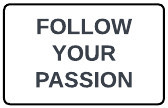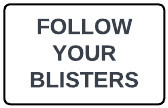What really motivates us?
This post looked at our motivations – what we find important and purposeful. It questions the idea of ‘following your passion” and offers another alternative approach that is no less fulfilling. Finally, it looks at how this approach applies to strategy and project management.
The Problem With Following Your Passion

The change of year is always a time when so many of us reflect on the past year and do some soul-searching on our path forward in the new year. The extended pandemic of the past few years has nudged people even more to reflect on how we spend our precious time.
On Monday morning, Jan 2, 2023, I opened my Harvard Business Review (HBR) “Management Tip of the Day” and found it particularly interesting. Originally published on Jan 1, 2021, at the height of the pandemic, it was a shortened, adapted version of an HBR article entitled, “What You Should Follow Instead of Your Passion” by Dan Cable. Dan Cable also wrote a couple of related books, “Power-and-Impact” – (HBR Emotional Intelligence Series) and “Exceptional: Build Your Personal Highlight Reel and Unlock Your Potential”.
The article and email highlighted a struggle that I – and I think so many of us – have had:
- How can I do less of what I think I should do?
- How can I do more of what provides meaning and fulfillment to me?
Conventional wisdom would tell us to follow our passions. But let’s take a deeper look at what really motivates us and gives meaning to our work – and what it is that we actually follow right now!
Let’s start by looking at three approaches related to following your passions.
1. Things that Matter to You
The first of three approaches outlined by Dan Cable related to following your passions is to think about “Things that matter to you”.
- What is important to you?
- What work do you think would provide the most meaning to you?
Indeed, it would be truly amazing to be working all day, every day, where both of those were covered! There would be importance and meaning in the work…
Let’s look at Cable’s second approach.
2. Things that Come Naturally to You
The second of three approaches outlined by Dan Cable related to following your passions is to think about “Things that come naturally to you”.
- What are you naturally good at?
- Aren’t the things that come easy to you the gifts from our Creator – talents you simply must use?
If you are naturally good at something, you will be drawn to it. And if you are drawn to it, and become easily immersed in it, it much provide a strong sense of importance and meaning to you. It must, at a minimum, ‘seem’ like it’s something you should be doing.
On the surface this approach sounds like a breeze!
But does life really work that way? Should we only do those things that we might list as being important to us, providing meaning, and coming naturally?
Will everything that truly needs to be done really get done if that’s the approach we take?
You might ask, “If not passion or things that come naturally, then what?”
3. Things that you Return to Time and Again

Cable asserts that there is something that goes beyond following your passion.
But let’s take a step back for a second…
I have often heard people say, “I want to do something that helps people.” Truly, there is certain work that clearly helps people directly – like teaching, providing medical care, counseling,…
But consider this. During the pandemic, I have seen many signs applauding “our healthcare heroes”. Indeed, healthcare is a “caring” profession and does help people. And especially during the pandemic, healthcare workers have needed an extra dose of courage to take on the risk to themselves.
But what about the delivery people who bring so many things right to our doorsteps…the construction workers who build and maintain our buildings…the customer service folks who help to troubleshoot our problems…the IT workers that design, build and manage our systems?
Don’t all of these people and professions ultimately help people in some important way? Wouldn’t they be sorely missed if they were not there?
Back to Dan Cable’s article…
Cable suggests that there is a third consideration for what we “should” do – “things that return to you time and again”. It seems that these things are at the intersection of the following:
- What is hard for you?
- What are you committed to completing?
There are things that we struggle with…but in the end give us a great deal of fulfillment. Perhaps it’s solving a complex mathematical problem…or slugging it out through scientific experimentation…or focusing our attention on improving a process until we are satisfied.
There are many ways to feel fulfilled…and to help people. That includes delivering the orders on time, building a structure with skill, providing customer support with care and a smile, or exercising skill in programming a new application.
Strategic Implications
Strategy is about determining the best place to go from here.
In designing a workplace that delivers value, perhaps these ideas tell us that it is important to give due consideration to designing the workplace to give workers the most chance at fulfillment.
Perhaps this kind of approach could be part of some other “strategic alignment” – more operationally oriented or capability driven – approaches such as:
- McKinsey 7S framework – A framework for holistic readiness of the organization which includes ‘soft’ elements such as skills, staff, and style.
- Resource based view framework – A framework for building strategy around the inherent strength of various organizational resources, including human resources.
- ADKAR model of individual change – A model for implementing change with special focus on the individual.
Incorporating thinking about what really makes people tick seems core to developing an effective strategy.
Impacts for Project Managers
Do project managers “help people”?
Of course. Implementing solutions is tough work – probably work in approach #3 above! Some things may come easy, but surely many will not. It takes persistence, discipline, and plain hard work to make that happen.
It also takes an understanding of people – and a willingness to mentor, lead, and guide them. That means reconciling with the reality of what truly motivates people and what measurably adds value.
- Do you simply motivate people by helping them to find their passion?
- Or do you only hire people who are “passionate” about the job you have?
I would argue that most often, you will hire and lead people to success that are more aligned with #3 above!
So, it’s probably folly to try to find something that will fulfill everyone…but practical and effective to try to help people find satisfaction and fulfillment is whatever it is that needs to be done.
Conclusion and Further Resources
This post looked at what motivates us – what is important and purposeful. It questioned the idea of ‘following your passion’ and offers the alternative approach of ‘following your blisters’. Finally, it looked at how this thinking applies to strategy and project management.
What do you think best addresses personal motivation and passion?
This tip is adapted from “What You Should Follow Instead of Your Passion” by Dan Cable, in the November 24, 2020 Harvard Business Review.
For a deeper dive into Dan Cable’s works, see his books:
- “Power-and-Impact” – (HBR Emotional Intelligence Series)
- “Exceptional: Build Your Personal Highlight Reel and Unlock Your Potential”
Hi, John.
Thanks, well written, but sounds painful to follow blisters!
Take care,
Craig
Yeah – kind of ugly! Thanks for the comment.